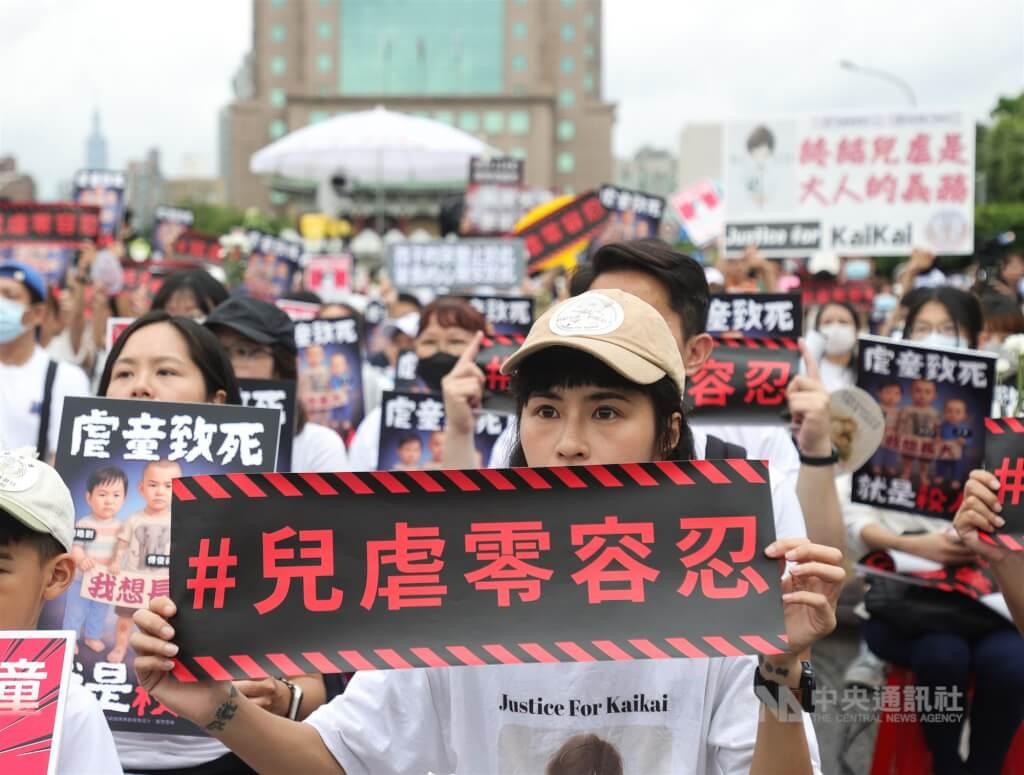The Legislative Yuan today passed the third reading of amendments to the Criminal Code, which would allow the death penalty for those who abuse children under seven which results in death.
The amendments also increase the sentence for murder by half if the victim is aged under seven.
The amendments were made in response to public outrage following the death of a one-year-old boy nicknamed Kai Kai (剴剴) in 2023, who was tortured to death on Christmas Eve by his licensed at-home caregiver and her sister.

Photo: CNA
The proposed amendments to Article 271 of the Criminal Code were supported by the ruling Democratic Progressive Party (DPP) and the opposition Chinese Nationalist Party (KMT) and Taiwan People’s Party (TPP), though opinions differed on amendments to Article 286.
As the opposition holds the majority of the legislature, the proposal by the KMT and TPP was passed today.
Article 271 currently states that murder can be punished by the death sentence, life imprisonment or a sentence of more than 10 years, while preparing to commit murder carries a sentence of up to two years.
The third reading passed today has added a clause that if the victim is under seven years of age, the sentence would be increased by half, while if the child is killed due to abuse, the death penalty or life imprisonment may be applied.
The penalty for preparing to murder a child under seven has also been increased to a maximum of five years in prison.
Moreover, Article 286 currently states that “a person who maltreats a minor under the age of eighteen or impairs the mental or physical health or development thereof” can be sentenced to a minimum of six months and a maximum of five years.
If a person commits the offense intending to make a profit, they face imprisonment of at least five years and fines up to NT$3 million (US$102,000).
The amendments would increase the penalties by half if the victim is aged seven years or younger.
Abuse that results in the death of a child under seven may now be punished by the death sentence, life imprisonment or at least 10 years in prison, and abuse resulting in serious injury would now be punishable by at least 10 years in prison.
If the act is committed for profit, resulting in death, the offender can now receive a death sentence, life imprisonment or at least 12 years in prison, while if it results in serious injury, the penalty would now be life imprisonment or at least 12 years in prison.
For victims aged seven to 18, if abuse results in death, the offender shall be sentenced to life imprisonment or at least a 10-year sentence, while if the offense is committed for profit and results in death, the offender shall be punished by life imprisonment or at least 12 years in prison. If the abuse results in serious injury, the sentence for the offender would be set at a minimum of 10 years.

The Coast Guard Administration (CGA) yesterday said it had deployed patrol vessels to expel a China Coast Guard ship and a Chinese fishing boat near Pratas Island (Dongsha Island, 東沙群島) in the South China Sea. The China Coast Guard vessel was 28 nautical miles (52km) northeast of Pratas at 6:15am on Thursday, approaching the island’s restricted waters, which extend 24 nautical miles from its shoreline, the CGA’s Dongsha-Nansha Branch said in a statement. The Tainan, a 2,000-tonne cutter, was deployed by the CGA to shadow the Chinese ship, which left the area at 2:39pm on Friday, the statement said. At 6:31pm on Friday,

The Chinese People’s Liberation Army Navy’s (PLAN) third aircraft carrier, the Fujian, would pose a steep challenge to Taiwan’s ability to defend itself against a full-scale invasion, a defense expert said yesterday. Institute of National Defense and Security Research analyst Chieh Chung (揭仲) made the comment hours after the PLAN confirmed the carrier recently passed through the Taiwan Strait to conduct “scientific research tests and training missions” in the South China Sea. China has two carriers in operation — the Liaoning and the Shandong — with the Fujian undergoing sea trials. Although the PLAN needs time to train the Fujian’s air wing and

The American Institute in Taiwan (AIT) put Taiwan in danger, Ma Ying-jeou Foundation director Hsiao Hsu-tsen (蕭旭岑) said yesterday, hours after the de facto US embassy said that Beijing had misinterpreted World War II-era documents to isolate Taiwan. The AIT’s comments harmed the Republic of China’s (ROC) national interests and contradicted a part of the “six assurances” stipulating that the US would not change its official position on Taiwan’s sovereignty, Hsiao said. The “six assurances,” which were given by then-US president Ronald Reagan to Taiwan in 1982, say that Washington would not set a date for ending arm sales to Taiwan, consult

A Taiwanese academic yesterday said that Chinese Ambassador to Denmark Wang Xuefeng (王雪峰) disrespected Denmark and Japan when he earlier this year allegedly asked Japan’s embassy to make Taiwan’s representatives leave an event in Copenhagen. The Danish-language Berlingske on Sunday reported the incident in an article with the headline “The emperor’s birthday ended in drama in Copenhagen: More conflict may be on the way between Denmark and China.” It said that on Feb. 26, the Japanese embassy in Denmark held an event for Japanese Emperor Naruhito’s birthday, with about 200 guests in attendance, including representatives from Taiwan. After addressing the Japanese hosts, Wang